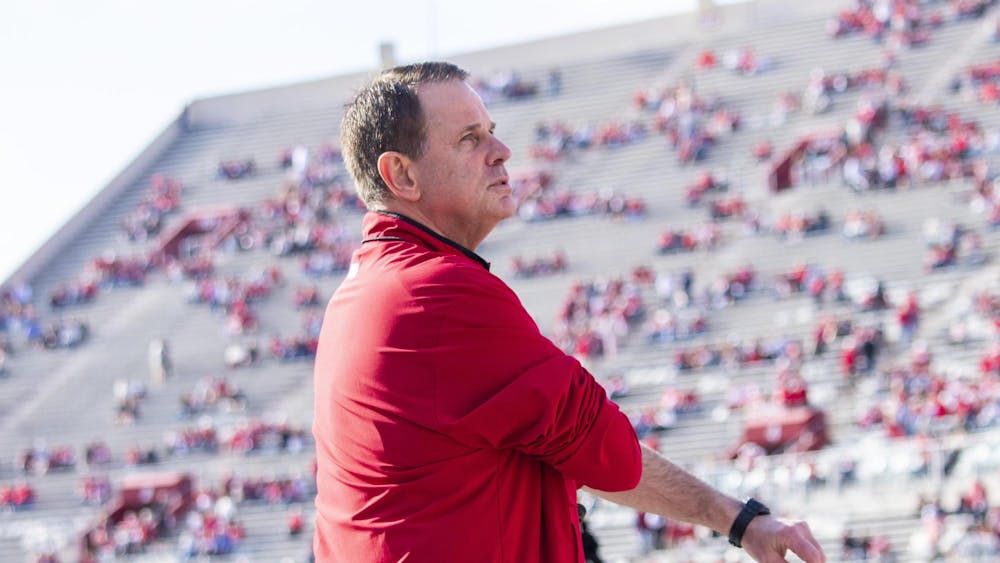How would a scientist and teacher react if he were asked to teach that oxygen and hydrogen fused to form water by the will of God, and not because of a chemical reaction?\nSince Friday, Professor Parvez Hoodbhoy, a physics professor from Pakistan's Quaid-e-Azam University, has been telling IU students about the Muslim nation's efforts to "Islamize every form of knowledge." He is concerned that pervasive Muslim fundamentalists' interpretations of science might not be able to coexist with modern science. \nHe also addressed the risks of an accidental nuclear war, Pakistan's relations with its neighbors and the condition of education in Pakistan. \nHoodbhoy said he believes these issues are of importance because "Muslims constitute about a fifth of humanity. Also, the issue of Islam and science is of importance not only to the future of Muslims but to everyone."\nAs an insider -- Muslim by birth and a physics professor in Pakistan -- he has been expressing concerns about the inability and unwillingness of Islamic countries to develop science and a scientific culture.\n"To me, science is not just about technology. Science also brings with it a very particular world view. Acceptance of science and rationality implies that a society accepts laws that are made by humans for humans, instead of following some version of divine law interpreted by clerics," Hoodbhoy said.\nNoretta Koertge, professor emeritus of history and philosophy of science, said one of the most interesting aspects of the history of science is the relationship between science and religion.\n"It is a question science educators in America have to deal with -- creation science in the classroom," Koertge said. \nKoertge planned Hoodbhoy's lecture, "Can Islam and Science Co-Exist."\nHoodbhoy said he never thought about society or the welfare of others when he went to MIT from an elitist school in Pakistan in 1969. \n"You only thought about your own personal advancement," he said. \nFrom 1969 to 1973, in the midst of the Vietnam War, he was an undergraduate at the Massachusetts Institute of Technology. Many groups on the campus actively protested MIT's involvement with the war. \n"What bowled me over was seeing the student community up in revolt against their own government, whom they saw fighting an unjust and cruel war," Hoodbhoy said. "I never thought that the people of a country could rise up against their own government."\nHe also saw years of war between East and West Pakistan, and Hoodbhoy said the atrocities committed closer to home forced him to look within and join political demonstrations on campus. Hoodbhoy said these began his early years as a committed Marxist.\nAt MIT he fell in love with physics and "saw it as a window into the marvelous world of nature."\nRecognizing the futility of protesting the situation in Pakistan from America, he decided to return to Pakistan. At home he worked with peasants and workers for two years while teaching at Islamabad University.\nHoodbhoy returned to MIT in 1975, received his doctorate degree in nuclear physics and returned to Pakistan in 1978. He has since been a professor at Quaid-e-Azam University and has been involved in social causes.\n"Initially I worked at bringing justice for the poor. In time the focus shifted to fighting against nuclear weapons and militarism and fighting for democracy and education," Hoodbhoy said. "Educating people about sciences occupies most of my time these days." \nKoerteg said she was struck by his commitment to his country and science.\n"As an MIT-trained physicist who has published and continues to publish extensively in Physics Review and other top-ranked journals, he could obviously find a very comfortable position outside of Pakistan," Koerteg said. "Yet it is very clear that he believes his mission is to contribute to science education in Pakistan, to try to influence public policy there in a way that will permit people to have 'cultural pride'..."\nHoodbhoy has been outspoken in his distaste for Pakistan's acquisition of nuclear weapons. He said the country became involved in the nuclear race after India began to build atomic weapons.\n"While initially Pakistan was driven to possess nuclear weapons, it now is very happy with it and under no circumstances will give it up," Hoodbhoy said.\nSenior Hilal Ahmad, who is from Pakistan, said Monday's discussion gave him a chance to talk with one of his country's leading thinkers.\n"Dr. Hoodbhoy spoke about the likelihood of a war between Pakistan and her eastern neighbor, India, stating that such a war would most likely occur because of a miscalculation by the parties involved, leading to a war that neither side really wanted, and where nuclear weapons would almost certainly be used." said Ahmad, treasurer of the Pakistani Student Association.\nHoodbhoy also addressed science education. \n"Today, out of 48 Muslim countries, not one can be called scientifically developed in the sense of Western Europe, Japan or even India, and that less than 1 percent of names in science journals are Muslim," he said.\nHoodbhoy said that during the last 700 years, not one invention has been attributed to Muslims. He said that's a problem that has resulted in a "massive importation of Western technology, ideas and the fruits of science, but science itself." \nHoodbhoy said he believes the Muslims' adherence to traditional values has worked to their disadvantage. He said the Palestinians are getting a "raw deal" in the Israel-Palestine issue because they are a traditional society.\n"No one cares because it is a traditional society versus a modern society," he said. \nBut he was quick to point out that Muslim society has lost out both because of imperialism and colonialism, as well as the cruelties it has inflicted upon itself.\nAs examples, he mentioned the Taliban's treatment of women and the growth of violent religious sectarian movements in Muslim countries.\nHoodbhoy said he does not claim to have the answer to whether science and Islam are compatible because "there does not exist a universally acceptable definition of 'Muslim.'"\nWhile the physicist might seem pessimistic, he is far from it. \nThough he looks at himself as a "very ineffective reformist," he said he does not give himself "an 'F'" because he keeps trying.\nHe said not all is lost with Islamic countries.\n"Most Muslim countries have people who understand the need for science and modernity," Hoodbhoy said. "The revival of science in Islam is a process that will ultimately gain strength. The process is slow because Islamic culture advocates authoritarianism and is disinclined toward change."\nBut Hoodbhoy said he sees "an opportunity for cultural subversion through science. A weapon that not only can be used but must be used"
Science pitted against religion
Pakistani professor fights to reconcile his country's Islamic beliefs with laws of nature
Get stories like this in your inbox
Subscribe





